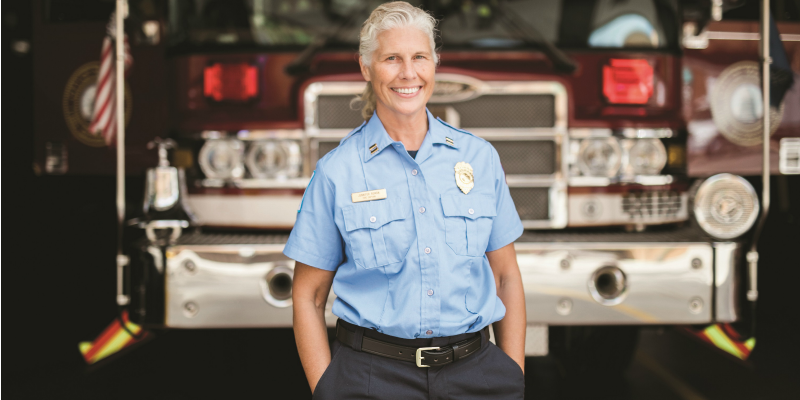By Marni McEntee | Photographed By Jen Dederich
Not long after Jen Roman joined the Madison Fire Department, she had to make a few adjustments— to her equipment.
Roman found out as a recruit that her standard-issue air tank didn’t sit well on her female frame. When she’d look up to grab something on the truck, her helmet would hit the tank on her back, making it hard to move her head, or do her job.
Her supervisor, then lieutenant Ron Schwenn, helped her sort it out.
“What he figured out was that—I have hips—the way that my tank sits is much higher than on a man, so he had to figure out that I have to loosen all my straps and let that tank drop on my back,” Roman says.
“Many people would just go, ‘she can’t do it because she’s a woman.’ Tokenism. You’re different for whatever reason, you make a mistake, and the majority says it’s because of your difference, whatever that is,” Roman says. Not Schwenn.
Firefighting wasn’t something that Roman had really considered as she grew up. Nobody did.
But just after high school in Racine County, Roman says “life swept around me.” She had a stint as an acting major at DePaul University, but she realized she was too shy to be on stage.
So, she quit and enrolled at UW-Milwaukee as an English major, but that didn’t stick, either.
When she moved to Madison for the man who would become her husband, she had a couple of jobs and was volunteering as an emergency medical technician. She found that helping people was her passion.
She started teaching EMT classes and a friend nudged her into becoming a paramedic. “When I graduated and I got my license, the only gig in town was the Madison Fire Department. That was the only place that hired paramedics in the area,” Roman says. After 19 years on the force, Roman’s risen to captain and oversees the EMS section.
“Nationwide the percentage of female firefighters has been between 4 and 5 percent for 18 years or so,” Roman says. The number of women in officer ranks is “statistically insignificant,” she says. “I call it the brass ceiling.” Of the roughly 400 Madison fire personnel now, 41 are women, she says.
Recruitment is tough to this day, Roman says, because gender roles are ascribed so young. She remembers being out in the fire truck about five years ago, and stopping at a school, where the first-grade kids rushed over to the machine. Roman started asking kids what they wanted to be when they grew up. The girls said “teacher, hairdresser or dancer.”
“And then I said, ‘what about a firefighter like me?’ And you could just see the confusion roll over their faces, like I had just spoken in Russian. It was never even a thought,” she says.
Schwenn says it really still comes down to it being a “white man’s world.”
“Despite what we might want to see differently. You just look at it as, in a lot of ways, it’s still a white man’s world and especially in a job like firefighting, which carries this machismo with it. To be a woman in that world, you’ve got a lot working against you,” he says.
So Roman helped launch Camp Hero, which introduces young girls to police, firefighting and other nontraditional occupations.
“We did a lot of research and found out that by the time kids are in kindergarten they already have stereotypical gender roles and assumptions. We also know that if you challenge those assumptions at that age, that they open up to it and consider that,” she says.
For the women on the force now, Roman says, it’s common thinking that they’re swimming upstream every day. Roman keeps swimming. “That woman has more inner strength and inner drive than a lot of people I’ve ever met,” Schwenn says of Roman.
“The older I’ve gotten and the more ascribed power that I have, the higher my feminist flag waves,” Roman admits. “My strategy now is just to call it out, and not rudely or anything, just to suggest. For example, you hear people use the term fireman. That’s pretty common. My approach to that would be, ‘did you know that there’s a gender-neutral term you can use? It’s firefighter and it includes all of us. Consider using it.’”
This article is part of our “Daring to be Different” series from the October 2017 issue. Click to view the articles with Alex Nieves Reyes and Sandy Thistle.




